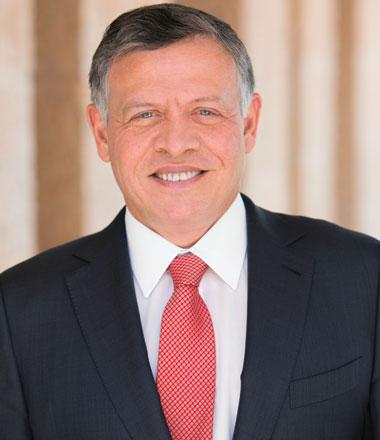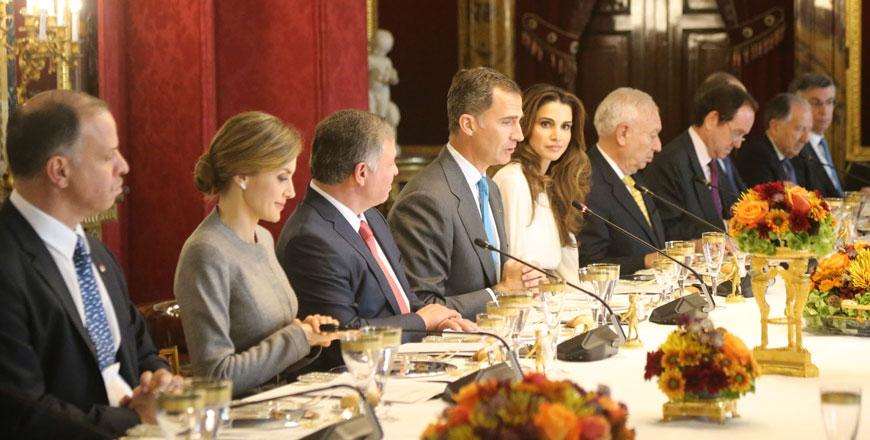You are here
King arrives home at conclusion of New York visit
By JT - Oct 02,2015 - Last updated at Oct 02,2015

AMMAN — His Majesty King Abdullah returned home on Thursday after a visit to New York, where he addressed the 70th Plenary Session of the United Nations General Assembly, and met with a number of world leaders.
While in New York, the King also participated in a counter-terrorism summit held by US President Barack Obama.
In his UN address, the King proposed seven steps the world should take to succeed in its fight against extremists and terrorists.
In his speech to the coalition summit, His Majesty stated that violent extremism is "the greatest collective threat of our time". He also celebrated the success of the international campaign to counter Daesh's momentum while simultaneously focusing on the need for the international community to work together more effectively.
His Majesty also stressed the need for a more holistic approach to fighting the terror group, focusing on supply chains, the flow of foreign fighters, cyber-space, and the ideological basis for the conflict.
He affirmed that the threat of terrorism is global, not regional, and includes groups such as Boko Haram, Al Shabab and others fighting in Libya, Yemen, Mali, Afghanistan and elsewhere in Asia and Africa.
The King concluded by stressing the importance of addressing the Palestinian-Israeli conflict to the battle against terror and extremism, stating that the world cannot remain silent on Israeli violations of the sanctity of Al Haram Al Sharif in Jerusalem.
On the sidelines of the UN General Assembly meetings, His Majesty, accompanied by HRH Crown Prince Hussein, met with Polish President Andrzej Duda, Japanese Prime Minister Shinzo Abe, and King Willem-Alexander of the Netherlands to discuss ways to confront terrorism and radicalism, the Syrian refugee crisis and the need for international support for host countries of refugees, such as Jordan.
A meeting with Italian Prime Minister Matteo Renzi focused on Israeli violations in Jerusalem and on economic cooperation between the two countries through the Euro-Mediterranean Partnership.
At meetings with Bosnian President Dragan Covic and Kosovo’s President Atifete Jahjaga, talks concentrated on the international threat of terrorism and extremism and the need for a coordinated response, and called for the dissemination of Islamic values of tolerance and moderation.
The King also met with a number of African leaders, including Nigerian President Muhammadu Buhari, Senegalese President Macky Sall, Somali President Hassan Sheikh Mohamud, Ethiopian Prime Minister Hailemariam Desalegn, Ugandan President Yoweri Musuveni and Mali’s President Ibrahim Boubacar Keita. He discussed with them regional and international cooperation on combating terrorism and extremism, as well as ways to ensure closer cooperation between Jordan and African partners.
During these meetings, it was announced that Jordanian embassies will be opened in Dakar, the capital of Senegal, and Addis Ababa, the capital of Ethiopia, to boost bilateral relations with both countries.
At a meeting between His Majesty and Egyptian President Abdel Fattah Al Sisi, both leaders stressed the importance of a political solution to the Syrian crisis. They also discussed the need for a revival of Palestinian-Israeli peace negotiations and the current Israeli violations at Al Aqsa in Jerusalem.
The King affirmed his continued support for Iraq and efforts to advance the cause of peace in the country in a meeting with Iraqi Prime Minister Haider Al Abadi.
At a meeting with UN Secretary General Ban Ki-moon, accompanied by Crown Prince Hussein, His Majesty called for attention to the continued Israeli violations in Jerusalem. He also discussed the significance of international support to assist host countries to shoulder the burden of Syrian refugees.
The King affirmed the importance of this assistance at a meeting of the Clinton Global Initiative, where former US president Bill Clinton agreed that Jordan is shouldering this refugee burden on behalf of the international community and called for greater support for the Kingdom to ensure that Jordanian host communities are not negatively impacted by the influx of Syrian refugees.
While in the US, King Abdullah also visited the US-based West-Ward Plant in New Jersey, US, a subsidiary of Hikma Pharmaceuticals PLC and its agent in the US. The visit included a meeting with the company’s Vice Chairman Mazen Darwazeh and board members, and discussed ways to enhance Jordan’s pharmaceutical industry and the country’s potential as a destination for investments in this field.
Related Articles
AMMAN — His Majesty King Abdullah focused on the Syrian refugee crisis and Israeli violations in Jerusalem during a series of meetings held
AMMAN — His Majesty King Abdullah on Tuesday discussed, in a meeting with British Prime Minister Theresa May, the economic challenges facing
AMMAN — His Majesty King Abdullah held talks with Spanish King Felipe VI on Friday and stressed that Jordanian-Spanish ties are firm and dee


















